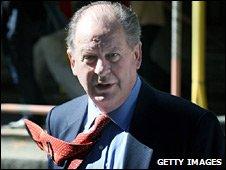MPs blast expenses scheme chiefs
- Published

Sir Ian defended the scheme
The men in charge of the new expenses system have faced tough questioning by MPs reviewing their annual budget.
Chairman Sir Ian Kennedy, Chief Executive Andrew McDonald and finance director Philip Lloyd faced a "tough" 90-minute grillling by MPs.
Tory Charles Walker, Labour's Nick Brown and Lib Dem Bob Russell criticised the costs and other aspects of the new system.
The Speaker's Committee reviews the expenses body's annual cost estimates.
'Tough' questions
At one point Speaker John Bercow said he could not hear Ipsa chairman Sir Ian Kennedy because there was "a lot of heckling" and "muttering" going on.
Mr Bercow told Sir Ian he hoped he would understand it was a "tough" interrogation to get the right answers.
MPs repeatedly questioned the costs involved in running Ipsa - which was set up to replace the discredited system after the MPs' expenses scandal.
Although the body is independent of Parliament - the Speaker's Committee of MPs reviews its annual estimate of running costs to ensure it is "cost effective".
But a decision to pay a communications director up to £85,000 and employ two further communications staff were among points of contention with MPs.
Lib Dem Mr Russell asked what they were for, suggesting they were "spin doctors" who were "designed to undermine the integrity of members of Parliament".
"No, they are not," Sir Ian replied.
Mr Russell also questioned whether Ipsa staff would get bonuses - when told they might get a "modest reward recognition scheme" - vouchers worth "£20 or so". Mr Russell asked if his staff could get access to the same scheme.
To "hear hears" from other MPs, he said the system had "destroyed the ethos of the public service I thought I had been elected to serve".
Tory Charles Walker asked what the point was of a new "compliance officer" - on a salary of up to £90,000 - who would take about 5% of Ipsa's budget.
'Time consuming'
The officer will investigate complaints against MPs and could have the power to fine them for expenses wrongdoing.
Mr Walker said MPs would have to be "crazy" to try to fiddle their expenses after the scandal and under the new "pretty tight" system.
He suggested that since laws were passed to set up the position, things had "moved on".
"I'm not exactly sure ...what your compliance officer is going to do," Mr Walker said.
"It almost strikes me he is going to be a kind of a Witch Finder General, trying to find someone who's overspent five quid on their stamps, investigating them. The public called in for the hearing. The £5 paid back."
Sir Ian pointed out that the officer's position had been included in the bill that went through Parliament - and he would also help advise people on expenses, among other things.
But he said Ipsa's board might review the job to see if it should be part time, or only one day every few weeks.
MPs also asked why Ipsa had not simply issued MPs with credit cards to allow them to pay for work- related goods rather than implement the "time consuming" expenses system.
Sir Ian said that would mean Ipsa would lose a "very important tool of compliance" because there would be no guarantee that any of the purchases would be backed by the necessary evidence.
He said about 160 MPs have applied for loans and Ipsa, which came into operation eight weeks ago, had paid out loans to the value of nearly £200,000, £650,000 in advances, and nearly £300,000 of expenses claims.
'More austere'
Labour's Nick Brown asked for examples of other jobs where people had to "spend their own money up front to carry out their job. What's the comparator?" he asked.
Sir Ian responded there were "lots of circumstances" under which people paid their own expenses upfront and had to claim it back - he said he would respond in writing with examples, to murmurs from MPs.
Among the other complaints was the length of time MPs had to spend filling in expenses claims on the new computerised system. Ipsa said they were now offering members one-to-one tuition.
Ipsa estimates that MPs' staffing costs and expenses costs may be £12m a year lower than the previous expenses scheme and aims that its own running costs will be cheaper than the old one, MPs were told.
Sir Ian said Ipsa had already been looking to make 5% a year in cuts - and some costs, such as furnishing and IT costs would fall after initial payments.
He accepted the new expenses regime was "more austere" than the old one - which might be reflection of the times and what the public wanted.
- Published24 June 2010
- Published23 June 2010
- Published16 June 2010
- Published14 June 2010